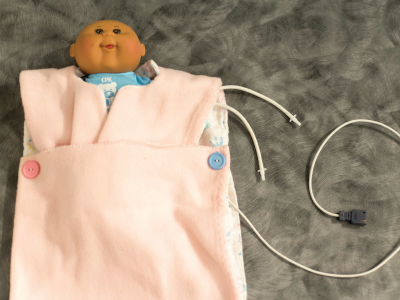Five Questions With hand-n-hand Founder Deborah Armstrong

Upon meeting Deborah Armstrong, one thing is clear—she is absolutely passionate about helping others. That’s why she founded hand-n-hand, a company that makes neonatal intensive care unit (NICU) swaddling blankets to provide a better experience for parents holding their premature babies.
Deborah is also part of JumpStart’s Core City: Cleveland Impact program, an intensive business assistance program designed to support the development and growth of businesses located within some of Cleveland’s most underserved neighborhoods.
We recently had the opportunity to sit down with Deborah as she shared the moving story of how her business came to fruition, how she plans to give back to the community and her words of wisdom for budding entrepreneurs.
What inspired you to create hand-n-hand?
My son, Joseph was in the NICU for two months—he was born two pounds, three ounces. Every time they would swaddle him with the traditional swaddling method, I would always set off an alarm–and that would alarm me. Even though the nurses would let you know that it was okay, in the back of my mind it wasn’t.
Four months later my son had open heart surgery. After his surgery, a candy striper came in and asked if I wanted to do memory prints. I did a memory print of my handprint with Joseph’s in the center, and in block letters I wrote “hand in hand.” 12 days later my son passed. 12 months later, I started my business.
What market niche does hand-n-hand fill and what are your future plans for the product?
In the NICU they use two blankets, which takes the nurse about two minutes to swaddle. All the IVs and leads are tucked inside, so you can never see where they are or if they become dislodged. It’s very cumbersome, and mothers are always setting off an alarm or a monitor. I created a blanket that allows minimal restrictions for the leads and IVs while also cutting the swaddling time from two minutes to roughly 20 seconds.
Looking toward the future, I want grow the business in order to start the Joseph Denver Armstrong (JDA) Foundation. Not only was my son born premature, but he was also born with Down syndrome. The JDA Foundation will allow portions of my profits to go towards helping families who have children with disabilities. And once those children become teenagers and adults, the JDA Foundation will also provide them with job training, education, and employment opportunities.
How did you first connect with JumpStart and learn about the Core City Cleveland Impact Program and what do you think about the program so far?
Last September, I visited JumpStart on a business tour. I entered the pitch competition for that event, and I won the grand prize. Part of that prize was five hours of extensive training at JumpStart with Lamont Mackley.
What I’ve really enjoyed about the program is having the chance to develop a better understanding of my customer. Additionally, understanding market research has allowed me to develop a better product. And I like the fact that everyone in the program is in the same boat. We’re not in competition with each other, and entrepreneurs are entrepreneurs no matter their product. We are all truly the same.
Are there any unique challenges you feel you’ve had to face as a female African American entrepreneur? Do you have any advice for overcoming these hurdles?
My advice is not to limit yourself. We think that there is a severe hurdle with being African American or being female, but if you have a quality product, don’t let your ethnicity or your gender be the reason why you can’t be successful. If you believe in your product and have a quality product, then it will stand for itself.
We ask all the entrepreneurs we speak with to give us examples of failure or setbacks they experienced. Anything come to mind for you?
I made large investments in my idea prior to doing my market research. Market research is such a key component for every entrepreneur, because you need to know the value you bring to the customer and you must understand your customer’s needs. You may think your product brings value, but you have to really listen to your customer. Then, you can make necessary pivotal decisions before investing a lot of money.
Watch Deborah’s elevator pitch for hand-n-hand below. To learn more about the Core City: Cleveland program, click here.